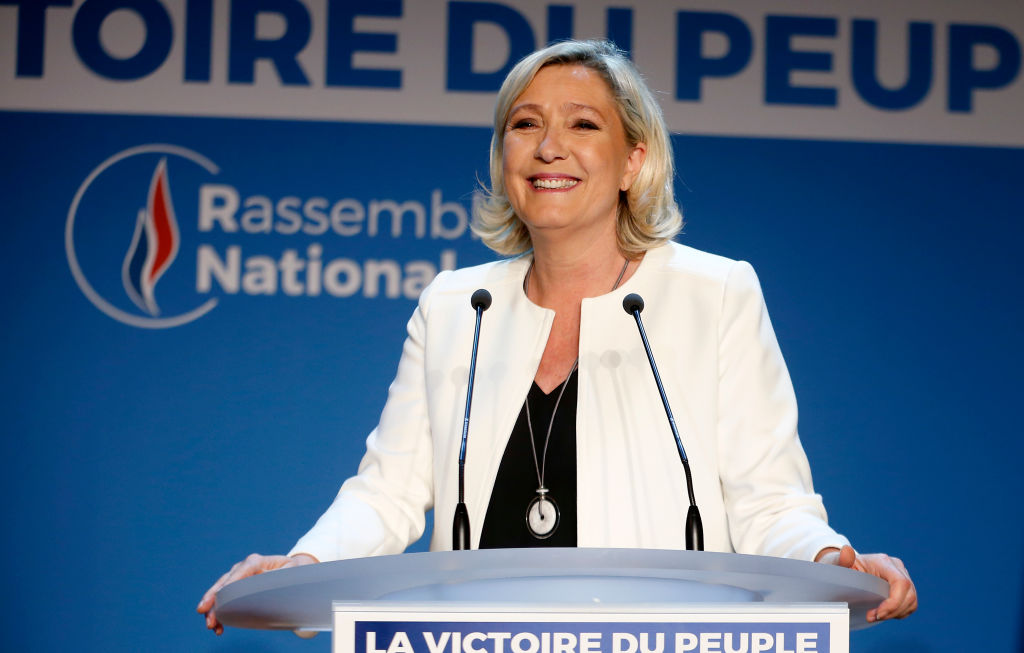
A giddy sense of triumph has taken hold among Europe’s strident right-wing nationalists since Sunday night, after they won the European Union’s parliamentary elections in the U.K., France and Italy—three powerhouse economies—potentially setting the stage for a shakeout on parts of the Continent.
But despite the individual victories, the populist and nationalists parties remain splintered across several political groupings in the E.U’s legislative body and are more likely to continue battling against the establishment than replacing it completely.
“The people took back the power tonight,” France’s Marine Le Pen thundered late Sunday, after her National Rally, or RN, party narrowly beat President Emmanuel Macron’s group in France’s biggest E.U. election turnout in decades.
The elections, held every five years across 28 countries for 751 delegates to the European Parliament in Brussels, are crucial in shaping policy on bitterly divisive issues like migration, trade, and public spending.
The impact of the results reverberated within their individual nations. In Italy, the League Party led by Interior Minister Matteo Salvini took 34% of the vote, far exceeding expectations and confirming its status as the most powerful political movement in the country. And after the new hardline Brexit Party came first in the E.U. elections in the U.K. on Sunday night, its leader Nigel Farage insisted he had earned the right to participate alongside the government in Brexit negotiations with the E.U.
In France, the results marked a powerful symbolic reversal of the 2017 presidential election that delivered power to Macron. About 200,000 more French voters opted for Le Pen’s fervently anti-immigrant message than Macron’s liberal, business-friendly policies.
Yet for all the celebrations among far-right leaders on Sunday, the victory will not herald the populist takeover of the European Union that some had predicted. In fact, when the new European Parliament convenes in Brussels on July 2, the nationalists and populists could struggle to push through their election promises, or to halt decisions against which they campaigned.
For one thing, the nationalist parties remain deeply divided; The Fidesz party of Hungary’s Prime Minister Viktor Orban, for example, which won a huge 52% vote on Sunday, sits in a different political bloc in Brussels than Le Pen and Salvini; other nationalist leaders are split over issues like Russian sanctions, the environment, and migrant quotas.
And even if they succeed in uniting on some decisions, they still have too few seats in the European Parliament to make a profound impact, despite their strong showing on Sunday. “There are a bit more than 200 members among the nationalists and populists, all put together,” says Fabrice Pothier, Chief Strategy Officer of political consultancy Rasmussen Global, who is French and a strong Macron supporter. “It is not a blocking majority.”
That might be one reason Macron appears unmoved by Le Pen’s election victory. Le Pen’s new RN party beat Macron’s Republic on the March (LREM) by less than one percent, and is likely to have the same number of seats in the European Parliament as before. Meanwhile, Macron—whose party is too new to have had any seats in Brussels until now—will now have 23 delegates, the largest number in a new liberal-democratic bloc.
In a measure of the deep disaffection against Macron, about 44% of supporters of the Yellow Vest protest movement voted for Le Pen’s party, while many others supported the environmental party, Europe Ecology—the Greens. Yet Macron’s razor-thin loss was not as bad as it might have been given the recent popular upheavals in France, analysts said. “It was a kind of victory for Macron,” says Dominique Moisi, analyst for the French Institute of International Relations, or IFRI, in Paris. “Of course it is not a victory when you come number two. But it is not a defeat, given the huge hostility to Macron.”
The E.U. elections signaled a likely rematch between Macron and Le Pen in the 2022 presidential elections—one that polls suggest Le Pen is virtually certain to lose again. “There is no majority of French who want to see her take charge,” Moisi says. “The chances of Macron being reelected in 2022 are still strong.”
By then, Macron and other centrists might well have taken some lessons from their losses this month. Crucially, Macron, like mainstream politicians elsewhere, will now need to show he grasps the deep frustrations felt by Europeans living not in the glittering capitals, but in provincial areas severely hard-hit by stagnant or declining growth, and the disappearance of industrial jobs. “You have everywhere in Europe, and I would say everywhere in the Western world, a split between two parts of the nations,” French Finance Minister Bruno Le Maire told TIME earlier this year, as the E.U. campaign took off. “One part is benefiting from globalizing, and the other part is suffering from globalization.”
Much like in President Donald Trump’s 2016 campaign, Le Pen masterfully tapped into that frustration in the E.U. campaign, portraying Macron as a disconnected elitist. After Sunday’s loss, Moisi says, “I would hope there will be at least a humility effect now, about how people perceive things outside Paris.”
More Must-Reads from TIME
- Donald Trump Is TIME's 2024 Person of the Year
- Why We Chose Trump as Person of the Year
- Is Intermittent Fasting Good or Bad for You?
- The 100 Must-Read Books of 2024
- The 20 Best Christmas TV Episodes
- Column: If Optimism Feels Ridiculous Now, Try Hope
- The Future of Climate Action Is Trade Policy
- Merle Bombardieri Is Helping People Make the Baby Decision
Contact us at letters@time.com